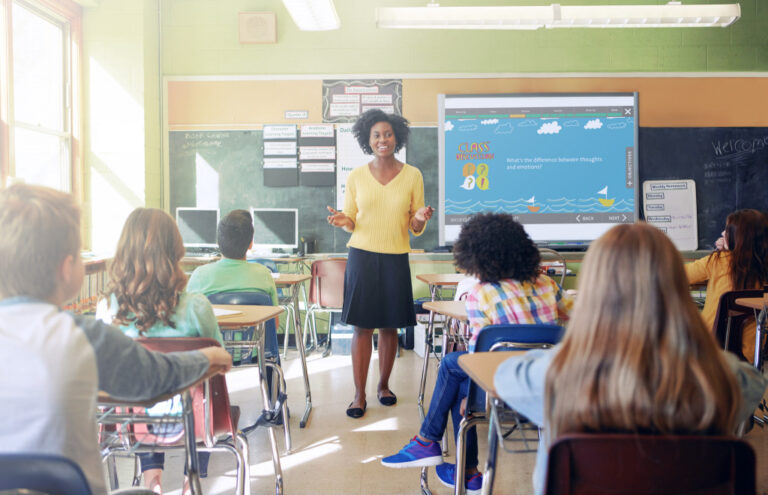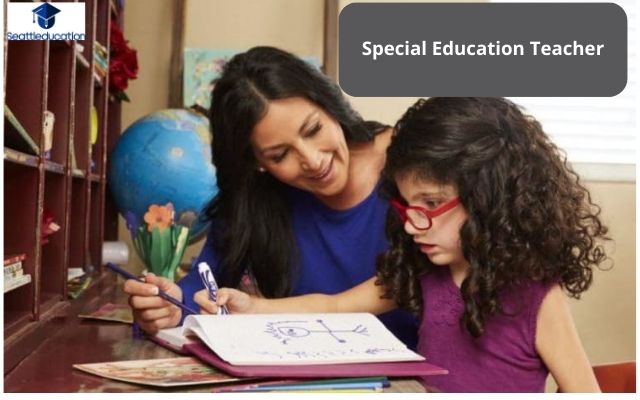How To Be A High School Counselor? The Ultimate Guide
How To Be A high School Counselor? Are you interested in becoming a high school counselor? As someone who has been working as a counselor for the past five years, I can tell you that it is an incredibly rewarding career. Helping young people navigate through some of the toughest times in their lives and watching them grow into successful adults is truly priceless.
First and foremost, being a high school counselor requires strong communication skills. You’ll need to be able to listen actively, ask meaningful questions, and provide guidance and support to students from all backgrounds. Additionally, having empathy and being non-judgmental are key traits that will help you build trust with your students, so they feel comfortable coming to you with their problems.
In this article, I’ll share my top tips on how to become a successful high school counselor based on my personal experiences in the field. Let’s get started!
Let’s get started!
Understanding The Role Of A High School Counselor
As someone who has worked as a high school counselor for several years, I know just how important it is to understand the role of this position. One crucial aspect of being a counselor in a high school setting is advocacy. As a counselor, you must be an advocate for your students and ensure that their needs are met both inside and outside of the classroom.
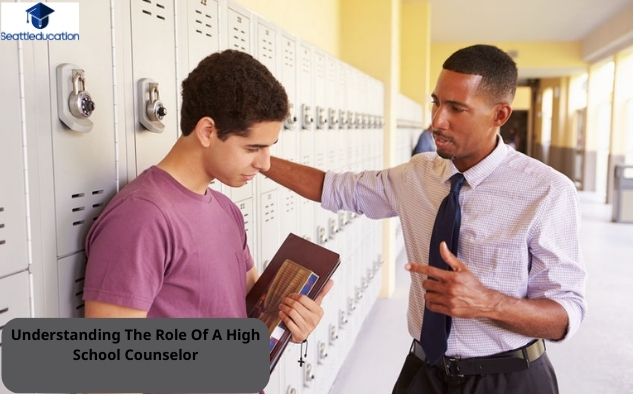
Prevention strategies also play a significant role in the work of a high school counselor. It’s essential to take proactive measures to help students avoid potential issues such as drug use or bullying. Being culturally competent is another vital part of this job; counselors need to understand and respect diversity while providing support that meets each individual student’s unique needs.
Confidentiality considerations are always at the forefront of our minds as high school counselors. Students need to trust us with sensitive information, so we must maintain confidentiality unless there is an imminent threat to safety.
Additionally, parental involvement can significantly impact our ability to provide effective counseling services, which is why building strong relationships with parents is crucial. Understanding these aspects of national counseling event sets the foundation for success in this field. In the next section, we’ll explore how developing strong communication skills goes hand-in-hand with fulfilling these responsibilities.
Developing Strong Communication Skills
Now that we’ve covered the basics of being a high school counselor, let’s talk about developing strong communication skills.
As a counselor, your ability to listen actively and use appropriate body language is crucial in building trust and rapport with students. Active listening involves giving complete attention to what someone is saying without interrupting or judging them. By doing so, you can better understand their needs and provide more effective support.

Body language is equally important when communicating with students. It includes facial expressions, gestures, and posture. Being aware of your own body language and how it may be interpreted by others allows you to convey empathy and understanding nonverbally. Additionally, observing a student’s body language can help you identify any underlying emotional issues they may be experiencing.
Conflict resolution and cultural competency are also vital components of effective communication as a counselor. Conflict resolution involves helping students resolve interpersonal conflicts while fostering positive relationships between diverse groups of people requires cultural competence – an understanding and appreciation for different cultures, values, beliefs, behaviors, and practices.
In order to cultivate empathy and understanding towards all students regardless of their backgrounds or experiences, counselors must continue educating themselves on various topics related to diversity and inclusion.
This means seeking out opportunities for professional development on these subjects or engaging in ongoing conversations with colleagues who have different perspectives than oneself will only enhance one’s effectiveness as a high school counselor.
Cultivating Empathy And Understanding
To be a successful high school counselor, it’s essential to cultivate empathy and understanding. Empathy exercises can help you develop the ability to put yourself in your students’ shoes and understand their perspective. This skill is crucial for building trust with them.
Active listening is another important tool that will help you connect with your students on a deeper level. When you actively listen, you give your full attention to what they are saying without interrupting or judging them. This approach shows that you value their thoughts and feelings, which helps foster an environment of openness and mutual respect.
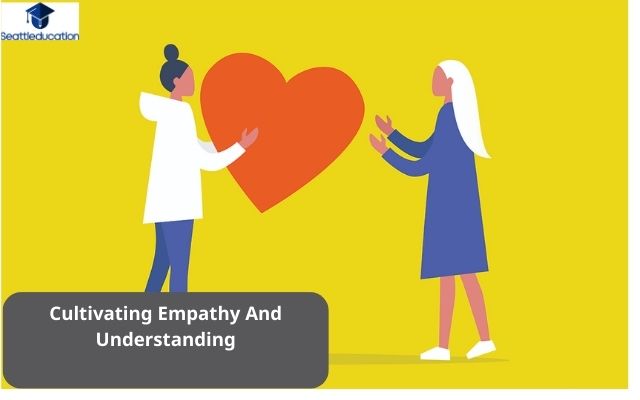
Cultural sensitivity and diversity awareness are also critical components of being an effective high school counselor. You must recognize and acknowledge cultural differences between yourself and your students to create a welcoming space where all feel seen, heard, and understood. Compassionate communication is paramount when addressing sensitive topics such as race, religion, or sexuality.
As you develop these skills, you will build trust with your students over time. Trust is vital because it enables them to confide in you about personal issues affecting their well-being. In the next section, we’ll discuss specific strategies for establishing rapport with students so that they feel comfortable sharing their concerns openly with you.
Building Trust With Students
Building Trust with Students: When it comes to being a high school counselor, building trust with students is paramount. One of the best ways to do this is through active listening. I make sure to give my full attention when a student comes to me for guidance. This means putting away any distractions and truly focusing on virtual school counselor positions, both verbally and non-verbally.
Another important aspect of building trust is following confidentiality guidelines. It’s crucial that students feel safe sharing their thoughts and feelings with me without fear of judgement or repercussions. By maintaining strict confidentiality, I’m able to create a space where students can be open and honest about their struggles.
Empowering students is also key in building trust. When they come to me for help, I work with them collaboratively to find solutions that are tailored specifically to their needs. Consistent follow-up allows us to check in on progress and adjust strategies as needed.
Lastly, honesty and transparency are essential components in our relationship-building process. Moving forward into promoting mental health and wellness, it’s important to remember that these steps don’t happen in isolation but rather build upon each other towards a greater goal.
Promoting Mental Health And Wellness
Now that we have covered the importance of understanding mental health, let’s discuss how you can promote it in your role as a high school counselor. As someone who is passionate about helping students thrive, there are several strategies you can employ to create safe and supportive spaces for them.

Firstly, make sure to prioritize self-care strategies for yourself. It is easy to get caught up in taking care of others without paying attention to our own emotional well-being. By prioritizing self-care practices such as exercise, meditation or therapy sessions, you will be better equipped to support your students effectively.
Secondly, creating safe spaces within the school environment is crucial for promoting mental wellness among students. This means fostering an inclusive community where everyone feels heard and accepted regardless of their background or beliefs. You can achieve this by organizing events that celebrate diversity or providing resources for marginalized communities.
Lastly, incorporating mindfulness practices into your counseling sessions can help students develop effective coping mechanisms when dealing with stressors such as exams or peer pressure. Encouraging deep breathing exercises or guided meditations during appointments may help students feel more grounded and centered.
To further enhance your efforts at promoting mental health within schools, consider implementing peer support programs and sharing information on available mental health resources with both staff and students alike. These initiatives offer additional avenues through which individuals experiencing challenges with their mental health can receive guidance and professional assistance.
As counselors, we play a vital role in supporting our youth not just academically but also emotionally. In the subsequent section, we will explore ways in which counselors can provide academic guidance and support while still maintaining focus on student well-being.
Providing Academic Guidance And Support
When it comes to providing academic guidance and support, my focus is on helping students develop strong study habits. One of the best ways to do this is by encouraging them to set aside a specific time each day for homework and studying.
I also work with students who struggle with time management, teaching them strategies like breaking down assignments into manageable chunks and using tools such as calendars or planners.
Another important aspect of academic guidance is helping students set goals. This could be anything from improving their grades in a particular subject to getting accepted into a competitive college program. By working together, we can identify what steps they need to take to achieve these goals and create actionable plans that will help them stay motivated along the way.
Test preparation is another area where high school counselors can make a big difference. From offering tips on effective study techniques to recommending test prep courses or resources, there are many ways we can support our students as they prepare for major exams like the SAT or ACT. Ultimately, my goal is always to help students feel confident and well-prepared when taking these tests so that they can achieve their best possible scores.
As we look ahead towards college readiness, I believe it’s critical for high school counselors to offer guidance around issues like selecting colleges that fit individual student needs and interests, applying for financial aid, and building resumes that showcase accomplishments both inside and outside the classroom.
Helping students navigate this complex process requires patience, empathy, and a deep understanding of each student’s unique strengths and challenges – but it’s also incredibly rewarding when you see your efforts pay off in the form of successful college acceptances!
In the next section, I’ll discuss How Long Does It Take to Become a School Counselor into this overall picture of supporting our high schoolers’ growth and development.
Facilitating Career Exploration And Planning
When I think about helping high school students plan for their future careers, I am reminded of the many resources available to them. As a counselor, it’s my job to facilitate career exploration and planning by providing opportunities for students to learn more about themselves and the world of work.
One way to help students explore their interests is through career assessments. These tests can provide insight into personality traits and skills that may be valuable in certain professions.
Additionally, job shadowing allows students to see first-hand what different jobs entail, giving them a better idea of what they might want to pursue in the future.
College readiness workshops are another great resource for high schoolers looking to prepare for post-secondary education. Topics such as financial aid, application processes, and study habits can all be covered in these sessions.
And once students are ready for college or entering the workforce directly after graduation, internships and mentorship programs offer invaluable hands-on experience and guidance from professionals in their chosen field.
Helping students navigate the path towards fulfilling careers requires collaboration with teachers and administrators. By working together, we can ensure that our students have access to all the resources they need to succeed beyond high school. In the next section, I will discuss some strategies for building relationships with other educators so that we can best support our students’ futures.
Collaborating With Teachers And Administrators
As a high school counselor, one of the most important aspects is effective collaboration with teachers and administrators. Working closely with these individuals can help ensure that students receive the support they need to succeed academically and emotionally. To achieve this goal, it’s essential to develop strong communication strategies that promote open dialogue, active listening, and mutual understanding.
Team dynamics are also crucial when working in a school setting. It’s essential to foster an environment where everyone feels valued and respected, regardless of their role or position. This involves recognizing individual strengths and weaknesses while promoting teamwork and cooperation.
Conflict resolution is another critical component of effective collaboration. When disagreements arise, it’s vital to approach them constructively by seeking common ground and finding mutually acceptable solutions.
Ultimately, building relationships is at the heart of successful collaboration as a high school counselor. By developing trust and rapport with colleagues, you can create a supportive network that benefits both staff members and students alike. Taking the time to get to know your fellow educators on a personal level can pay dividends in terms of improved communication, stronger team dynamics, and more effective conflict resolution skills.
As much as we strive for proactive measures within our schools, sometimes crisis situations occur that require immediate response from counselors. In such instances, responding to trauma effectively becomes paramount in supporting students through difficult times.
Responding To Crisis And Trauma
Dealing with crisis and trauma is one of the most challenging aspects of being a high school counselor. As someone who cares deeply about your students, it can be difficult to see them struggling with emotional pain and grief. However, by practicing trauma-informed counseling techniques and crisis intervention strategies, you can provide crucial support during these difficult times.
One key aspect of providing effective crisis intervention is building resilience in your students. This means helping them develop coping skills and healthy habits that will help them navigate tough situations both now and in the future. Additionally, supporting grieving students requires compassion, empathy, and a deep understanding of the unique challenges they are facing.
As important as it is to care for your students during times of crisis and trauma, it’s equally important to practice self-care strategies yourself. Being a high school counselor can be emotionally taxing work – but taking steps like prioritizing rest and relaxation or seeking out professional support when needed can help ensure that you’re able to bring your best self to each day on the job.
Continuing Professional Development
As a high school counselor, it’s important to stay up-to-date with the latest trends and developments in your field. Continuing professional development is a crucial part of this process. By engaging in ongoing learning opportunities, you can improve your skills and knowledge, enhance your job performance, and better serve your students.
One way to engage in continuing professional development is through professional networking. Connecting with other counselors, educators, and professionals in related fields allows you to share ideas, collaborate on projects, and learn from one another.
Attend local conferences or join online forums to expand your network and build meaningful relationships. Another avenue for continuing education is skill building workshops. These events provide hands-on training in specific areas such as conflict resolution, crisis management, or college readiness.
Look for workshops offered by reputable organizations in the counseling profession so that you can be sure they align with best practices.
Finally, educational conferences offer an opportunity to gain new insights into current issues facing high school counselors. Attending conference sessions led by experts in the field will give you access to cutting-edge research and techniques that you can bring back to your own practice.
In order to be effective in our roles as counselors, we must also take care of ourselves. Balancing self-care with the demands of the job can be challenging but it’s essential for long-term success. The next section will explore some strategies for maintaining wellness while working as a high school counselor.
Balancing Self-Care With The Demands Of The Job
When it comes to how long to become school counselor, balancing self-care with the demands of the job is absolutely essential. It’s not easy to be there for students day in and day out while also making sure you’re taking care of yourself, but it’s important if you want to avoid burning out.
One key aspect of finding balance as a counselor is time management. You need to make sure that you’re scheduling enough breaks throughout the day so that you can recharge and take care of your own needs. This might mean scheduling a quick walk or meditation session between meetings, or simply setting aside some time each week for activities that help you unwind.
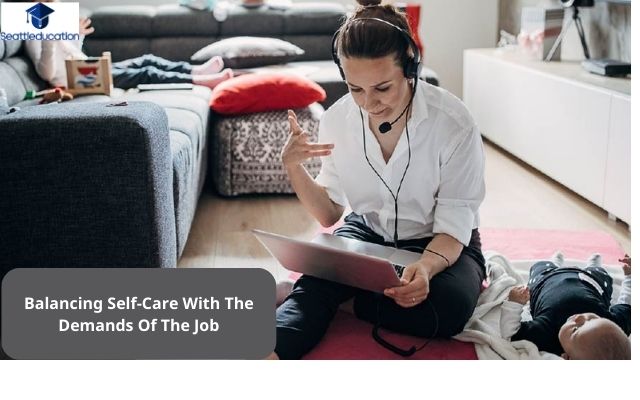
Another crucial element of staying balanced as a counselor is self-reflection. Taking time to reflect on your experiences and emotions can help you stay grounded even in difficult situations. Whether it’s writing in a journal, talking things over with a trusted friend, or practicing mindfulness techniques like deep breathing or visualization exercises, cultivating this habit will pay dividends both personally and professionally.
Of course, no one can do everything alone – which is why building up a strong support network is another vital component of maintaining balance as a high school counselor. Reach out to colleagues who understand what you’re going through, lean on friends and family for emotional support when necessary, and don’t hesitate to seek professional counseling if needed.
By prioritizing stress management techniques like these, you’ll be better equipped than ever before to handle whatever challenges come your way as a high school counselor without sacrificing your own health and wellbeing in the process.
Conclusion
Being a high school counselor is not an easy job, but it’s one that can be incredibly rewarding. As someone who has worked in this field for several years, I’ve learned so much about how to support students and help them navigate the challenges they face. From addressing mental health issues to supporting students with college applications, there are many important aspects of being a high school counselor.
By staying up-to-date on resources and best practices, counselors can make a real difference in the lives of their students. It takes patience, empathy, and dedication, but for those who are passionate about helping young people succeed, being a high school counselor is truly fulfilling work.

